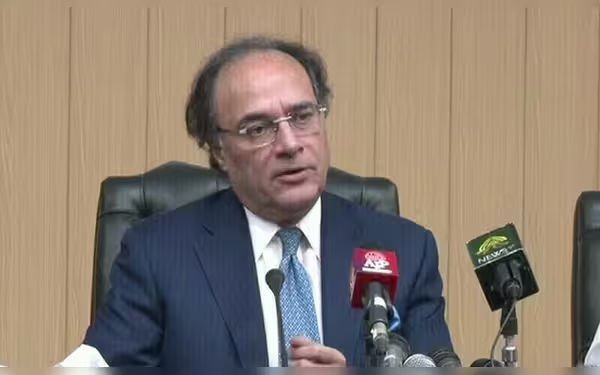Saturday, November 16, 2024 07:36 PM
Aurangzeb Advocates Tax Net Expansion for Sustainable Economic Growth
- Focus on expanding tax net, not just raising taxes.
- Population growth poses existential challenges for Pakistan.
- Privatization of SOEs essential for economic efficiency.
 Image Credits: dawn
Image Credits: dawnFinance Minister Aurangzeb emphasizes expanding the tax net to address Pakistan's economic challenges and promote sustainable growth.
In recent discussions surrounding Pakistan's economic challenges, Finance Minister Muhammad Aurangzeb has emphasized the importance of expanding the tax net rather than simply increasing taxes. This statement comes at a time when the country is grappling with significant issues such as population growth and climate change, which Aurangzeb describes as "existential problems" for the nation.
During a session at the Islamabad Literature Festival, Aurangzeb pointed out that the salaried class is already facing a heavy tax burden. He argued that relying on charity or donations is not a sustainable way for a country to operate. Instead, he stressed that a robust economy requires a well-structured taxation system to support long-term growth. "As a country our hand has been forced," he stated, highlighting the need to extend the taxation regime to sectors like real estate, wholesale retail, and agriculture. Without this expansion, he warned, the government would continually return to the same groups for more taxes, which is not a viable solution.
Addressing the alarming population growth, Aurangzeb raised concerns about the implications of a potential increase from 240 million to 400 or 450 million people. He described the current situation as a "ticking bomb" that has already exploded, citing issues like child stunting and learning poverty, particularly among girls and young women. Furthermore, he pointed to the pressing challenges posed by climate change, referencing the devastating floods of 2022 and the ongoing smog crisis in Lahore and Punjab. "De-carbonisation and air pollution, these are the issues that all of us should be talking about," he urged.
When questioned about the upcoming visit from an International Monetary Fund (IMF) team, Aurangzeb clarified that the delegation's purpose was primarily for "stock-taking." He expressed optimism about the country's progress, stating that Pakistan is "way ahead" in terms of new tax filers and is in a favorable position regarding quantitative and restructuring benchmarks. "We will now move forward and not look back. We will fix the system soon," he assured, indicating that the data supporting this progress is evident.
Moreover, Aurangzeb highlighted the necessity for reform in State-Owned Enterprises (SOEs), advocating for their privatization to enhance efficiency and management. He called for the private sector to take the lead in this process, suggesting that reducing dependency on the government could lead to better outcomes. He noted that there are various methods for privatizing public sector organizations, including full privatization, phased privatization, and outsourcing.
Aurangzeb's remarks underscore a critical juncture for Pakistan's economy. The focus on expanding the tax net rather than merely increasing taxes reflects a broader understanding of the need for sustainable economic practices. As the country faces pressing challenges, both demographic and environmental, it is essential for policymakers to adopt innovative solutions that not only address immediate fiscal needs but also pave the way for a more resilient future. The path forward will require collaboration between the government and the private sector, ensuring that all segments of society contribute to and benefit from economic growth.













